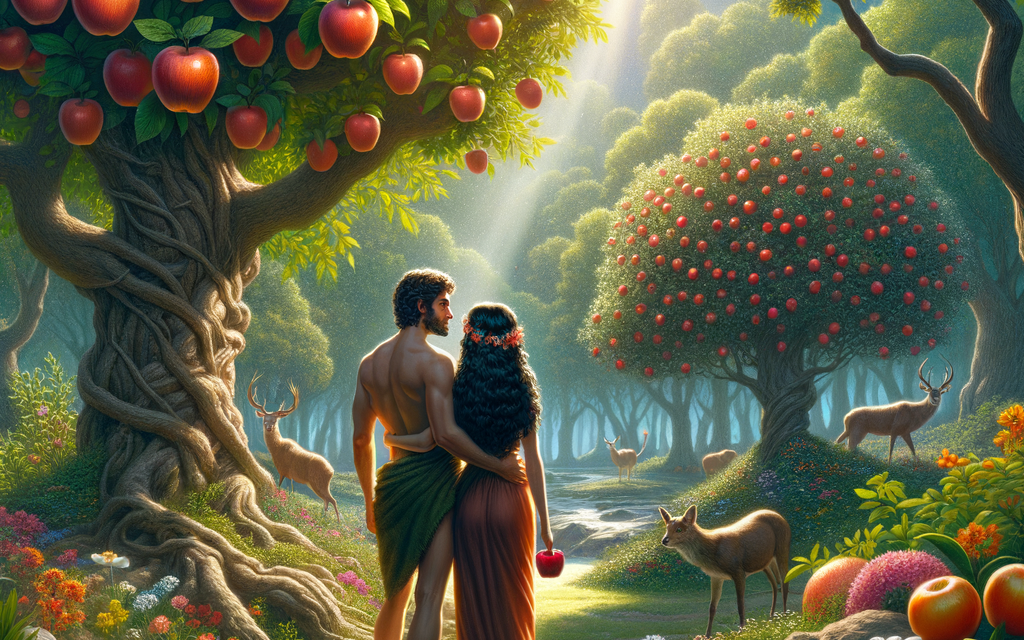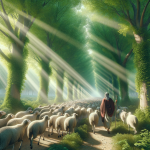The Story of Adam and Eve Explained
What is the story of Adam and Eve about?
The story of Adam and Eve is a profound tale nestled at the very beginning of the Bible in the book of Genesis. It tells of the creation of the first humans by the hands of God, who shaped Adam from the dust and breathed life into him (Genesis 2:7). He then crafted Eve from one of Adam’s ribs to be his companion (Genesis 2:21-22). Placed in the idyllic Garden of Eden, they lived in harmony, their lives devoid of toil, pain, or sorrow. Each day brought new wonders as they interacted with the lush environment provided to them. The narrative slowly unfurls this serene landscape, setting the stage for a pivotal moment that would alter human existence forever.
The centerpiece of this Edenic paradise was two unique trees: the Tree of Life and the Tree of the Knowledge of Good and Evil (Genesis 2:9). God gave Adam explicit instructions regarding these trees, telling him freely to eat from any tree except for the Tree of the Knowledge of Good and Evil. To consume its fruit would mean certain death (Genesis 2:16-17). This prohibition wasn’t just about a tree; it symbolized obedience and trust in God’s wisdom. The very essence of this story underscores a divine test of faith, highlighting that true freedom is intertwined with the boundaries set by God.
Enter the serpent, a cunning creature who approaches Eve with tempting words. He questions God’s command, planting doubt in her mind (Genesis 3:1). Eve, enticed by the idea of gaining wisdom, eats the forbidden fruit and offers it to Adam, who also eats (Genesis 3:6). In this fleeting moment, innocence is lost, and their eyes are opened to their nakedness and vulnerability (Genesis 3:7). They sew fig leaves together to cover themselves, their once unspoiled world now tainted with the knowledge of shame and sin. The narrative of Adam and Eve is a somber meditation on temptation, free will, and the eternal consequences of our choices.
Why did Adam eat the apple?
The fateful decision to eat the forbidden fruit is a complex moment layered with myriad motivations and consequences. The serpent’s deft manipulation played a critical role, exploiting Eve’s curiosity and desire for wisdom (Genesis 3:5-6). He convinced her that she wouldn’t die from eating the fruit, but rather be like God, knowing good and evil. Eve, beguiled, took the first bite. Her newfound discernment made her keenly aware of her nudity and guilt, a stark contrast to the innocence she formerly knew.
When Eve offered the fruit to Adam, he took it without hesitation (Genesis 3:6). It is tempting to perceive Adam’s act purely as an alignment with Eve, a desire not to be left alone in his human condition. This unity is at the heart of their relationship, as seen in Genesis 2:23, where Adam declares Eve as “bone of my bones and flesh of my flesh.” Thus, his decision could be viewed as an emotional response, spurred by his bond with Eve and a reluctance to suffer separation from her. Their act of defiance against God’s command wasn’t just a singular misstep, but a collective plunge, binding their fates together.
Yet, this action also illuminates a deeper truth about human nature. By taking the fruit, Adam asserts his autonomy, a desire to define his own existence separate from divine instruction. This resonant moment captures the perennial human struggle with authority and the allure of independence. As Romans 5:12 states, “Through one man sin entered the world, and death through sin, and thus death spread to all men, because all sinned.” Adam’s choice, though deeply influenced by Eve and the serpent, ultimately reflects a fundamental aspect of human identity—the yearning for self-determination, even against divine boundaries.
What did God say to Adam after he sinned?
Upon realizing their disobedience, Adam and Eve hastily covered themselves and hid among the trees, a futile attempt to escape the omniscient gaze of God. In this gripping scene, God calls out to Adam, “Where are you?” (Genesis 3:9). This query isn’t about physical location but rather a profound spiritual reflection. Adam’s response reveals his newfound fear: “I heard Your voice in the garden, and I was afraid because I was naked; and I hid myself” (Genesis 3:10). The words carve out the chasm that sin has forged—alienation from God and a life shrouded in fear and shame.
God then directs a series of questions to uncover the truth about their actions. He asks, “Who told you that you were naked? Have you eaten from the tree of which I commanded you that you should not eat?” (Genesis 3:11). Adam’s response is laden with deflection: “The woman whom You gave to be with me, she gave me of the tree, and I ate” (Genesis 3:12). This blame-shifting, from Eve to the serpent and, implicitly, to God Himself, underscores the relational rupture that sin has wrought. The encounter captures the full weight of human frailty and the complex interplay of guilt, blame, and evasion.
God’s pronouncement of consequences reflects not just punishment, but the irreversible transformation sin has wrought upon creation. To the serpent, He declares enmity between it and the woman’s offspring, foretelling a cosmic struggle culminating in victory through the serpentine’s head being crushed (Genesis 3:14-15). Eve’s suffering, characterized by pain in childbirth and relational strife, marks her new reality. Adam receives the harshest sentence: the ground is cursed because of him, and his life becomes a toil against thorns and thistles until death returns him to dust (Genesis 3:17-19). God’s lament is not just a curse, but a profound mourning of a broken communion, reflecting the gravity of human rebellion.
The tale of Adam and Eve is a timeless mosaic, interwoven with themes of creation, choice, and consequence. It resonates with the complex dance between free will and divine wisdom, urging us to ponder our own lives and the weight of our decisions. This ancient narrative beckons us toward reflection: In moments of doubt and temptation, how do we respond? Are we humble before the boundaries set by wisdom, or do we strive to assert our definition of good and evil? As you navigate your own Garden of Eden, consider the legacy of Adam and Eve, a poignant reminder of the cost of moral autonomy and the enduring grace that seeks to restore us.











